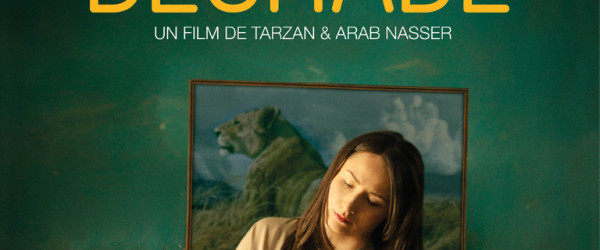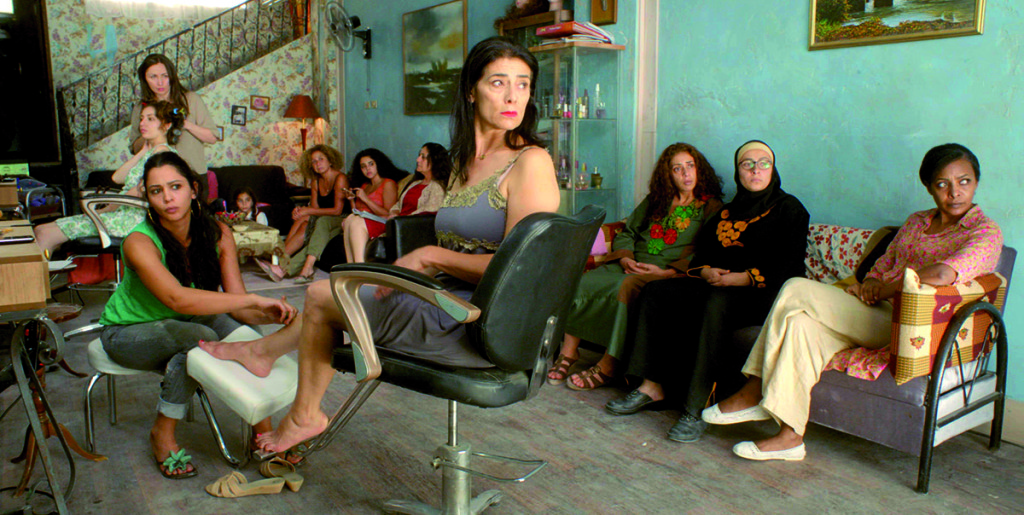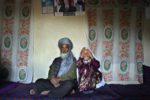Crossposted on Arab Hyphen
Dégradé, a film by Palestinian twin brothers Tarzan and Arab Abou Nasser, forces the viewer into a claustrophobic situation and cranks up the tension to an almost unbearable degree. The title (which refers to a layered haircut but also evokes the word degradation) is an apt one, as the film uses the enclosed space of a faded beauty salon as a microcosm of life in besieged Gaza. Inside the salon are thirteen women waiting their turn for a makeover, complaining on their phones and bickering with each other, while outside, a standoff ensues between gangsters and Hamas over a smuggled toothless lion escalates into what sounds like all out war. As the toothless lion and the punning title would suggest, the film is not subtle about hitting viewers over the head with its metaphors.
Dégradé has often been mentioned in relation to that other more favorably received film about a hair salon from the Middle East, Nadine Labaki’s Caramel. Both films are set in a women only beauty salon in countries suffering from chronic, seemingly unsolvable crises, and while depicting the divided society that results, they focus on the social pressures women face in their daily lives, with political public issues being kept to the background.
The Abou Nassers replicate the idea of the salon as a cocoon from the world, and some of the thirteen women in Dégradé are similar to characters appearing in Caramel, including the main characters being a hairdresser involved with an unsuitable man, and an older woman refusing to accept the aging process. However, the Abounassers do not follow Labaki’s successful formula in Caramel and her later film Where Do We Go Now, both of which have a romantic comedy element and a lightheartedness that has no place in Dégradé .
The About Nassers make choices that diverge from the expectations viewers might bring to a film set in a salon: they deny the viewer any easy visual pleasure. The salon in Caramel is full of beauty products and gleaming mirrors. It is a haven from the outside world – the outside world is reduced to a dusty street only visible through golden filtered light. In the final wedding scene, the viewer is presented with an idealized Lebanese landscape of greenery and traditional stone houses. Throughout the film, which shows women using beautification rituals as a retreat from and a weapon against a patriarchal society, the female director provides eye candy in beautifully lighted and posed shots were the camera lingers on her actresses (not least the director herself who plays what is arguably the lead role).
The Gazan salon in Dégradé, in contrast, has garish mismatched furnishing and flaking wallpaper. Everything looks grimy and faded. One reviewer even complains that the lighting doesn’t flatter the actresses, as if he is sympathizing with models or beauty pageant contestants not being shown at their best (the “lighting does no favors to any of the actresses“).
One of the directors comments on the implications of the film not providing conventional eye candy in an Arabic language interview, where he calls the salon “a small place but a place of beauty in its composition, not its elements,” and says that in a way it is just like Gaza where “there are no mountains, no trees, no landscape.”
The Abou Nassers don’t give us any scenes that look carefully composed to highlight absurdity in the manner of Palestinian director Elia Suleiman, where the worst tragedies are in some ways softened by fantasty or irony. They don’t give us any suspense building beautifully lit symbolic montages as in Paradise Now, by another Palestinian director, Hany Abu Assad, where the dramatic scene of the suicide bombers’ preparations is represented as a ritual evoking sacred spaces. The juxtaposition of sacred ritual and the prepration for murder is meant to be shocking. In Dégradé, even the final lingering shot of the lion and his gangster keeper is not tightly framed, the juxtapoisiton of the two figures not aesheticised or composed.
Instead, the directors force the viewers “to stare at the cramped, dark salon for over an hour,” as a way to evoke the claustrophobic pressure cooker atmosphere of Gaza. Reviewers have not appreciated this. According to one reviewer, in fact, Dégradé “is doggedly conventional from its single setting to its largely one-note characters.” The Guardian went with a punning putdown, calling it a “film of hairy events in Gaza Strip beauty salon” that “could use a trim.” The Hollywood Reporter reviewer found it to be “a would-be metaphoric comedy set in Palestine’s war-torn Gaza Strip” which “turns into an unfunny free-for-all,” while the Variety reviewer described the women as “13 female stereotypes.”
Having read all this beforehand, I was prepared to be greatly underwhelmed when I went to see the film, and at first, I was inclined to agree with the bad reviews: many of the characters were underdeveloped, in particular the woman who might be described as the protagonist, assistant stylist Wedad (Maisa Abd Elhadi), who alternates between snapping at the customers, calling her gangster boyfriend, and weeping while gazing out of the shrouded doors and windows of the salon. Meanwhile Christine (Victoria Balitska), the Russian owner, keeps calling her Palestinian husband to complain about how much she hates her job, the lack of electricity, and the mad hysterical women in her salon.
We do come to understand some of the characters better as the film unfolds – divorcee Eftikhar (Hiam Abbass), for example, initially comes off as conceited and mean, but when she grabs the lipstick when the small war breaks out outside, we understand that this is her coping mechanism.
The two characters that I found most interesting however are Safia (Manal Awad), and Zeinab (Mirna Sakhla). One reveiwer describes them as “a chatty busybody with a drug problem” and “a judgmental woman in a hijab,” and initially, they do seem like one note chatacters. But what interested me were the unexpected reversals involving these two characters. For example, Zeinab snipes maliciously at Safia for her irreverence throughout, seeming to be the stereotyptical judgemental neighbor. Later however we find out that the two are friends, and that Zeinab asked to go along with her friend to the salon to entertain herself. Safia seems to be the wild child, more liberated in contrast to uptight Zeinab, but, as we find out, Safia’s husband beats her and she does noting about it. Most symbolically, Zeinab, who is assumed to be a Hamas supporter, clarifies that she is for none of the sides. In that, she is like the others, who support no one when it comes to the intra-Palestinian political wrangling. In the climatic moment, Zeinab tries to keep the Hamas men from arresting the gunman who has taken refuge in the salon by telling the women to take their hastily wrapped headscarves off and shouting “we’re not covered” – though of course this doesn’t stop the men marching in.
Dégradé is at times very stereotypical, featuring macho men outside and hysterical women inside, and very dark, the women gathered in the salon performing an unrelenting litany of suffering. However, even though this dark comedy is heavy on the dark and light on the comedy, one of the moments of light heartedness is when Safia runs though a comically long list of acronyms in seeking to ascertain which political party another woman’s husband belongs to. Another moments of levity comes when Safia imagines herself heading a government of women which would naturally do a better job than either Fatah or Hamas men, handing out ministries based on the few defining characeristics the women have been afforded. One woman with asthma gets awarded the health ministry, the teenager on her phone is told she would be responsible for telecommunications, the woman who has suffered most form power cuts would be energy minister. However, immediately after this scene of Wise Brown Women vs No Good Brown Men, Safia gets drawn into an ugly catfight with Eftikar and the point is driven home: in this situation, everyone and anyone would go crazy. The women are no better than the men. It’s depressing, but then it is intended to be.
Dégradé for me captures the Arabic saying shar al-baliyyah ma yudhhik – “the worst catastrophe is the one that makes us laugh.” Is it an exaggerated drama? Yes, in the sense that there is nothing subtle about it, from the punning title to the toothless lion. But there is nothing subtle about the situation in Gaza – and maybe that is what is exaggerated, this catastrophe that leaves you so helpless you can only laugh.




